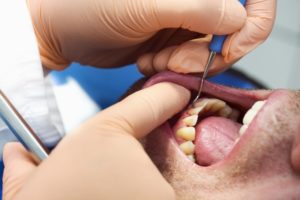Heart Health and Gum Disease Awareness in Jacksonville
February 12, 2019

Did you know that gum disease can affect more than just your gums? If you didn’t, you’re not alone. Nearly half of American adults over the age of 30 have periodontitis, a more advanced form of gum disease. Could you be one of them? February is National Gum Disease Awareness Month—the perfect time to help spread gum disease awareness in Jacksonville and learn about how it can affect your overall health.
What is gum disease?
Gum disease, also called periodontal disease, is an inflammatory condition the occurs in the gums. The bacteria that live in plaque create toxins that irritate your gum, making them red and swollen and sometimes bloody during brushing. This beginning stage is called gingivitis. Over time, the toxins cause the gums to pull away from the teeth, creating gaps where plaque and food particles can accumulate. At this point, it has developed into periodontitis and starts spreading. Ultimately, if left untreated, gum disease leads to tooth loss and permanent damage to the bone and tissue.
When you lose a tooth, it not impacts not only your smile’s appearance but also its function. You use your teeth to bite, chew, and speak, so losing one can make these tasks more difficult, leading to problems with digestion.
How does gum disease affect my heart health?
Although more research is needed to show definitive causation, studies have shown a correlation between gum disease and heart disease. In one study, those with both diseases were found to have higher cardiovascular care costs than those who only have heart disease. Other studies state that gum disease raises your risk of heart disease by as much as 20 percent.
What other ways can gum disease affect my health?
Gum disease has also been linked to many other diseases, such as diabetes, kidney disease, preterm birth, and certain kinds of cancer. One recent study suggests a possible connection between gum disease and Alzheimer’s. So how can a disease that occurs in your mouth influence so many different areas of the body? One theory states that when your gums bleed during gum disease, it may allow these harmful bacteria into your bloodstream, spreading and potentially causing inflammation throughout your body. All the more reason to take the steps necessary to treat and prevent gum disease.
How is gum disease treated and prevented?
For gingivitis, periodontal therapy in Jacksonville can be as simple as a routine cleaning. For more advanced cases, however, more intensive care may be needed. Your dentist may need to perform scaling and root planing—basically a deep cleaning and smoothing out of exposed root surfaces—to help prevent re-infection in the future.
Prevention is surprisingly simple. Do basic healthy oral practices, such as the following, and you can significantly lower your chances of getting gum disease:
- Brush twice daily.
- Floss once daily.
- Visit the dentist twice a year for checkups and cleanings.
In the end, gum disease is a serious condition that deserves your attention so that you can make sure it doesn’t have the chance to wreak havoc in your mouth and the rest of your body. As you become more aware of your oral health, you may even see some improvement in your overall health as well. For more information about gum disease and its effect on your health, contact your dentist in Jacksonville.
About the Practice
At North Jacksonville Complete Dentistry, Dr. Ryan Johnson and Dr. William Baxter take a different approach to dental care, looking at the complete health of the patient, not just dental health. They locate and address the cause of oral problems instead of just bandaging the symptoms. They also offer periodontal therapy for those with gum disease. To schedule an appointment with them, you can call or click here.
No Comments
No comments yet.
RSS feed for comments on this post.
Sorry, the comment form is closed at this time.
